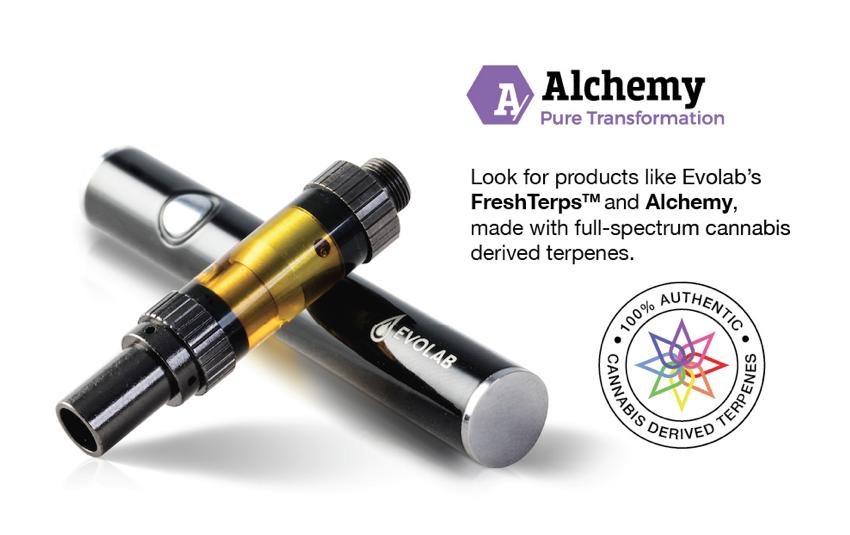
What Is Your Favorite Strain’s Personality?
Article sponsored by Evolab
If you are keeping up with the pace of cannabis culture, you have no doubt noticed that terpenes are showing up on shelves everywhere in different forms. Of the 50,000+ terpenes that are found in nature, over 140 of these flavorful compounds are specific to cannabis. Terpenes are found in varying combinations that give each strain its unique personality including flavor, smell, effects, and medicinal potential.
Walk into a dispensary today and you will see that concentrated terpenes are being heavily marketed in tandem with a variety of cannabis concentrates (like live resin and CO2 extracted oils). Each of these terpenes fall within a number of distinct categories including:
- Steam distilled terpenes
- Organic plant terpenes
- Synthetic terpenes
- Cannabis derived terpenes
That’s right – the terpenes you bought yesterday might not be the same terpenes you bought today. In fact, they might be completely different and have a totally different impact on your health and experience. So how do you navigate through the different types of terpenes to answer the million-dollar question: How do I truly capture my favorite strain’s personality, in concentrated form? Fear not, we are here to help.
The first thing that’s important to understand is that no matter where your terpenes come from, each terpene product is considered to be either full-spectrum, or not. A full spectrum terpene extract will capture the entire terpene profile of your favorite strain, in the same ratios as the original plant material itself; thereby, serving as a concentrated “twin” of the original plant profile. Non full-spectrum extracts will only have one or some terpenes, but not all of the terpenes that are found in the cannabis strain. Both can be found in cannabis concentrate products; however, full-spectrum extracts are much more rare as reproducing the full strain profile is more difficult than producing a partial terpene extract. The reason for this is how the terpenes are extracted, or in some cases, how the terpenes are manufactured.
The Entourage Effect of Full-Spectrum Terpene Profiles
Identifying which products have full-spectrum terpene profiles is of particular interest when trying to replicate the effects and flavor of your favorite flower. This is due to a phenomenon referred to as the “entourage effect,” which might hold the key to unlocking the true effects of cannabis strains, as well as their medicinal value. When consumed through vaporization, terpenes have unique effects independent of cannabinoids. Even more interesting is what happens when terpenes are delivered in tandem with cannabinoids like THC and CBD. The terpenes will actually elicit various effects like permeabilization of the blood brain barrier to allow access to larger molecules like cannabinoids. In other words, the terpenes open the brain’s “doors” which receives cannabinoids much wider than it would open if the user experienced cannabinoids on their own, without terpenes.
This entourage effect makes full-spectrum terpene profiles much more emblematic of the original cannabis strain’s personality, ensuring that the body receives the same ratio of terpenes and cannabinoids that would come from the cannabis plant itself. This protects the integrity of the original plant’s flavor, effects, and medicinal potential. Evolab, a Denver, CO based extraction company is doing extensive research around the entourage effect, and goes to great lengths to preserve the integrity of the strain’s original personality by offering full-spectrum terpene extracts with both their FreshTerps and Alchemy product lines. Alternatively, most other terpene products on the market are considered non-full spectrum extracts, which serve primarily as flavoring additives.
 The second consideration asks: Where did the terpenes come from? Are they synthetic, plant derived or cannabis derived? Chemically speaking, the brilliant bright lemon flavor in fresh cannabis is the same as the lemon smell released by lemons – it is the terpene limonene. It’s not uncommon for chemists to produce limonene and other terpenes synthetically in a laboratory, which do in fact have the same molecular structure as their plant-derived cousins. The subtle differences, however, are the impurities that might remain from processing of the terpenes, which is why synthetically processed terpenes may have remnants of harsh chemicals.
The second consideration asks: Where did the terpenes come from? Are they synthetic, plant derived or cannabis derived? Chemically speaking, the brilliant bright lemon flavor in fresh cannabis is the same as the lemon smell released by lemons – it is the terpene limonene. It’s not uncommon for chemists to produce limonene and other terpenes synthetically in a laboratory, which do in fact have the same molecular structure as their plant-derived cousins. The subtle differences, however, are the impurities that might remain from processing of the terpenes, which is why synthetically processed terpenes may have remnants of harsh chemicals.
Even if terpenes are naturally derived from plants like lemons or pine trees, these compounds may have other residual material from the plant it was extracted from that might lead to different aromas then if pulled directly from the cannabis plant. It has become industry standard to purchase terpenes from both natural and synthetic sources, and recombine them in an effort to improve the taste of cannabis products. For the aforementioned reasons, this could result in an experience that doesn’t truly capture the personality of your favorite strain. And some producers may not desire to create this effect. Flavors like bubble gum or cherry cola are not uncommon, and although novel, will not get you that true strain specific personality you are looking for.


